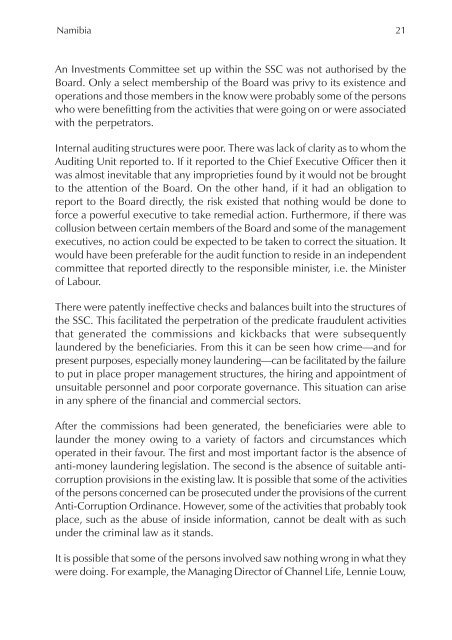Monograph 108 complete download - Institute for Security Studies
Monograph 108 complete download - Institute for Security Studies
Monograph 108 complete download - Institute for Security Studies
You also want an ePaper? Increase the reach of your titles
YUMPU automatically turns print PDFs into web optimized ePapers that Google loves.
Namibia<br />
21<br />
An Investments Committee set up within the SSC was not authorised by the<br />
Board. Only a select membership of the Board was privy to its existence and<br />
operations and those members in the know were probably some of the persons<br />
who were benefitting from the activities that were going on or were associated<br />
with the perpetrators.<br />
Internal auditing structures were poor. There was lack of clarity as to whom the<br />
Auditing Unit reported to. If it reported to the Chief Executive Officer then it<br />
was almost inevitable that any improprieties found by it would not be brought<br />
to the attention of the Board. On the other hand, if it had an obligation to<br />
report to the Board directly, the risk existed that nothing would be done to<br />
<strong>for</strong>ce a powerful executive to take remedial action. Furthermore, if there was<br />
collusion between certain members of the Board and some of the management<br />
executives, no action could be expected to be taken to correct the situation. It<br />
would have been preferable <strong>for</strong> the audit function to reside in an independent<br />
committee that reported directly to the responsible minister, i.e. the Minister<br />
of Labour.<br />
There were patently ineffective checks and balances built into the structures of<br />
the SSC. This facilitated the perpetration of the predicate fraudulent activities<br />
that generated the commissions and kickbacks that were subsequently<br />
laundered by the beneficiaries. From this it can be seen how crime—and <strong>for</strong><br />
present purposes, especially money laundering—can be facilitated by the failure<br />
to put in place proper management structures, the hiring and appointment of<br />
unsuitable personnel and poor corporate governance. This situation can arise<br />
in any sphere of the financial and commercial sectors.<br />
After the commissions had been generated, the beneficiaries were able to<br />
launder the money owing to a variety of factors and circumstances which<br />
operated in their favour. The first and most important factor is the absence of<br />
anti-money laundering legislation. The second is the absence of suitable anticorruption<br />
provisions in the existing law. It is possible that some of the activities<br />
of the persons concerned can be prosecuted under the provisions of the current<br />
Anti-Corruption Ordinance. However, some of the activities that probably took<br />
place, such as the abuse of inside in<strong>for</strong>mation, cannot be dealt with as such<br />
under the criminal law as it stands.<br />
It is possible that some of the persons involved saw nothing wrong in what they<br />
were doing. For example, the Managing Director of Channel Life, Lennie Louw,
















